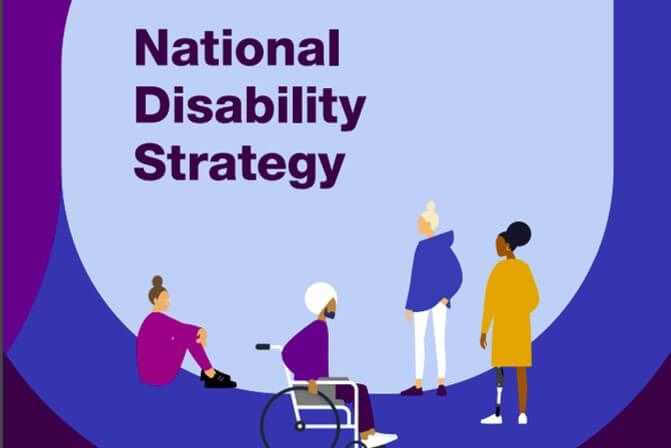In July 2021, the Government published its long-awaited National Disability Strategy, which has been in development for several years, and further delayed as a result of the pandemic. The Strategy has been informed by findings from a 2021 UK Disability Survey of 14000 respondents, and lived experience research on the lives of disabled people conducted both before and during the COVID-19 pandemic.
What’s in the Strategy
This Strategy sets out over 100 government commitments and is split into three parts:
- Part 1 outlines practical steps to be taken, in this year and next, to improve disabled peoples’ everyday lives in the areas of rights and perceptions, housing, transport, jobs, education, shopping, leisure and public services.
- Part 2 sets out changes to how government departments will embed disability considerations into its policy-making and service delivery, through the principles of ensuring fairness and equality, disability needs in the design of products and services including participation of those affected to provide inputs, supporting independent living and creating joined up responses in matters involving multiple departments.
- Part 3 details the commitments made by each government department to implement steps and goals described in the Strategy. Delivery of the commitments is overseen by Ministerial Disability Champions appointed for each department.
Tracking execution of the Strategy
The Government is holding itself to account for execution of the Strategy by stating that it will publish an annual report in Summer 2022 to provide updates on progress against plan.
Disability Watford’s focus on public transport challenges
At Disability Watford, we get more transport problems brought to our attention than any other issue, hence we are pleased to see the commitments being made in this domain, including:
- Taxis and private hire vehicles: this has been an ongoing campaign topic for Disability Watford. The Strategy promise to strengthen the law on the carriage of disabled people to protect from overcharging and ensure provision of appropriate assistance, and requirement for drivers to complete disability awareness training. This pledge builds on existing protections for wheelchair and assistance dog owners.
- Rail network and experience: a network-wide accessibility audit of station facilities will be conducted at all 2,565 mainline railway stations to inform future investment decisions, and Design Standards for Accessible Stations will be reviewed during 2021. Pledges are also made to develop proposals for the accelerated upgrade of rail station platforms with tactile paving, in addition to initiatives for improving the experience of disabled train passengers through development of a passenger assist app, and ways to improve communication of passengers with the train crew during the journey.
- Buses: regulations will be introduced by Summer 2022 to require bus companies to provide audible and visual announcements onboard their services. £1.5 million of additional funding, on top of the £2 million already committed, will be made available to bus operators, to deliver on this pledge.
Next steps
Disability Watford will be closely monitoring progress of these and the many other commitments made in the Strategy. Whilst it is of course a welcome development for the Strategy to be finally published, we do note that many of the commitments appear to be steps to conduct additional reviews and consultations rather than transformative action, and timelines for completion are not always clearly defined. We will continue to campaign at a local level for effective handling of transport challenges, and other important issues raised in the Strategy, with updates on our outcomes published on this site.
